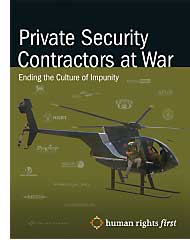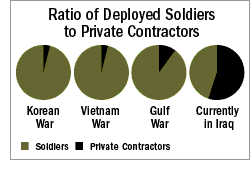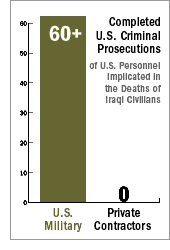“These guys run loose in this country and do stupid stuff. There’s no authority over them, so you can’t come down on them hard when they escalate force. . . They shoot people, and someone else has to deal with the aftermath.”
–Brig. Gen. Karl R. Horst, 3rd Infantry Div., USA, July 2005.

Today, Human Rights First released its report “Private Security Contractors at War: Ending the Culture of Impunity”(4MB PDF), which I helped write and edit. The report’s focus is not on the misdeeds of private military contractors in Iraq and Afghanistan. Rather it focuses on the United States Government, and particularly the Department of Justice. The Bush Administration has crafted a culture of impunity for contractors in Iraq. This can be seen in a number of acts and in a policy of official indifference towards violent crime involving contractors. The victims of this policy are Iraqi civilians, coalition military, and members of the contractor force themselves. As a senior general in Iraq recently told one of my colleagues: “The three biggest threats faced by American soldiers in Iraq are IEDs, al Qaeda fighters, and unaccountable contractors.” Repeated hearings and demands for action from Congress are ignored by the Justice Department.
Here are the prepared remarks I delivered at a press conference at the National Press Club this morning. I was joined by Kevin Lanigan of HRF and Admiral John Hutson, the former Judge Advocate General of the Navy, whose remarks can be heard on an MP3 downloadable here. Kevin played a major role in crafting the analysis of the report, and Admiral Hutson is one of a number of retired senior military officers who provided analysis and advice that was essential to the report. Representatives David Price (D-NC) and Chris Shays (R-CT), two key figures behind the Congressional push for a remedy, each offered remarks related to the report at the outset of the press conference.
In the spring of 2006, I was asked by a major broadcaster for some advice in connection with a reporter who had gotten into some trouble. In this connection, I spent several weeks in Baghdad, living and working in the “red zone,” and had an opportunity to witness things first hand and to talk with a number of Iraqis and U.S. military figures about conditions. One of the things that struck me immediately was the high profile role played by private military contractors. Iraqi reporters and staff all seemed to have a story to tell about some unpleasant interaction with security contractors; usually it involved the discharge of firearms, and often it ended with damage to property, a casualty or even the death of a loved-one. Did you report this incident to the authorities, I asked? I was quickly introduced to the principal of unaccountability. It was impossible to identify the actors, they said. They drive around in unmarked white Toyota SUVs without license plates—we have no idea who they are. And when complaints were lodged, they went into the circular file, because no one had responsibility for investigating and acting on them. When I spoke with U.S. military, I heard complaints too. I particularly remember speaking with a young Marine captain, who referred to contractors as “jackasses with guns.” “When my soldiers discharge a firearm outside of open hostilities, there’s an incident report and we look into it. But when contractors use their firearms, there’s no accounting for it.”
Now calling contractors “jackasses with guns” is very harsh language. It’s important to put this into context. The vast majority of contractors serving in Iraq are conscientious, dedicated professionals who serve effectively and courageously under difficult circumstances. They aren’t devils. But they’re not angels either. The purpose of this report is not to blacken the reputation of individuals or companies or to question whether it’s appropriate to use contractors. It’s to ask whether the U.S. Government and specifically the Department of Justice is fulfilling one of its core functions—law enforcement with respect to violent crimes.

Since the end of the Cold War, the United States has dramatically changed the configuration of the force it fields in a theater of war. The graphic you see to my left shows the ratio between uniformed soldiers and contractors deployed in a series of conflicts: the Korean War, the Vietnam War, the First Gulf War and the current War in Iraq. As you see there has been a dramatic shift to reliance on contractors, and in the current setting the U.S. uses about 160,000 uniformed soldiers in Iraq, but about 180,000 contractors. The reasons for this shift start with the perceived “peace dividend” that flowed from the end of the Cold War and are fairly complicated. But our point here is not to say there is anything wrong with this configuration. It’s simply to point to the fact that our accountability system doesn’t follow the configuration.

The accountability system focuses on the Uniform Code of Military Justice and the court-martial system. In the second graphic, you see a demonstration of how it works. In the current war, roughly 60 cases have been opened in which a soldier is implicated in a wrongful homicide. This number reflects rough continuity with accountability levels from prior wars—it shows that the system is functioning roughly as it should. Now let’s compare this with the situation governing contractors. The number is zero. No cases have been brought. Ask yourself whether it’s plausible that with a contractor population of 180,000 over a period of five years, there could be zero prosecutable violent crimes? And even if we consider only the Americans within this total—20 to 30,000 people on a steady basis, though the actual number is much higher because the contractors cycle in and out on a regular basis—still this figure is impossible. It reflects an official policy of indifference.
A few years ago, Secretary Rumsfeld was asked by a bright graduate student at Johns Hopkins how contractors were being held to account for violent conduct in Iraq? He responded that it was “the contractor’s responsibility.” Now, in a certain sense of course contractors have to account internally and to their contract officer. But Rumsfeld was dead wrong. Contractors are not responsible for enforcing the criminal law. That’s the responsibility of Government.
A few weeks ago, Secretary of State Condoleezza Rice, grappling with the controversy surrounding the Nisoor Square incident on September 16, 2006, explained that there was a “gap in the law” and that as a result contractors could not be held to account.
That statement was profoundly irresponsible. The conditions of immunity didn’t just fall from the sky. They resulted from carefully considered policies of the Bush Administration—starting with the decision to issue CPA Order No. 17, granting immunity to expat contractors in Iraq. We’re not saying that it was a mistake to issue Order No. 17, immunizing contractors from criminal prosecution by the Iraqi authorities. We are saying that having done so, the U.S. Government–and specifically the Department of Justice–assumed a heightened responsibility to provide for accountability in the form of law enforcement for violent crimes.
As this report shows, the law provides numerous tools that prosecutors can use to hold contractors to account. The problem is not the law. The problem is that the Department of Justice has gone AWOL, that it is ignoring its core responsibility for law enforcement with respect to violent crime. There may well be a number of legislative “fixes” that are appropriate. But we would be deceiving ourselves if we were to place the blame for the current problem on Congress. It belongs squarely at the doorstep of an agency which is shirking its responsibilities, the Department of Justice.


